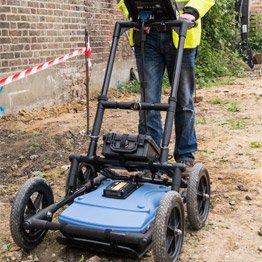Ground Surveying

To assist with quantifying & cost estimation Rowland Brothers Exhumations offer a Ground Penetrating Radar survey service in partnership with an experienced Semiologist.
This service can be conducted independently of any overall commitment and will provide a more accurate understanding of the scope of works required.
Our service includes:
• Provision of an experienced Seismologist with suitable GPR equipment
• Travel to any part of the UK
• Expert analysis of returned data
• Full professional report with explanatory notes & conclusions
Ground Penetrating Radar
Ground penetrating radar (GPR) is a geophysical survey method using radar pulses to map the sub surface. Conventional deep seismic surveying, as used in the oil industry, makes use of audio waves generated by explosives or heavy vibrating machinery as its source. By contrast GPR is a non-destructive and very portable method of surveying. High frequency radio waves, usually in the range from 10MHz to 2.5GHz are transmitted into the ground from a small aerial. When these waves encounter solid objects or boundaries between different sub strata they are reflected and can be detected by a second aerial. Unlike conventional seismic sources, which penetrate many thousands of metres into the ground, the radar waves have limited penetration.
Under ideal conditions about 15 metres can be achieved but the average depth achievable is about 2 to 4 metres. This makes the method ideal for archaeology and forensic purposes, as these first few metres are usually the area of most interest. Depending on the frequencies used, extremely accurate detail can be detected. The equipment used is very light and portable, and can operate in conditions where conventional methods, including mechanical excavation, would be impractical. It is also a lot less labour intensive than hand digging and has the advantage that artefacts can be detected with no risk of damage either to the artefacts or the surroundings.
A GPR survey can be carried out over most types of surface. Dry flat earth is best but the waves can penetrate rock and tarmac and, as long as the ground is flat enough to push the machine along, surveys can be carried out in most locations with very little preparation. The moisture content of the ground is the main limiting factor as high moisture causes dissipation of the radio waves so surveys are best not conducted during or after heavy rain.
For information on our ground surveying service, contact us.




